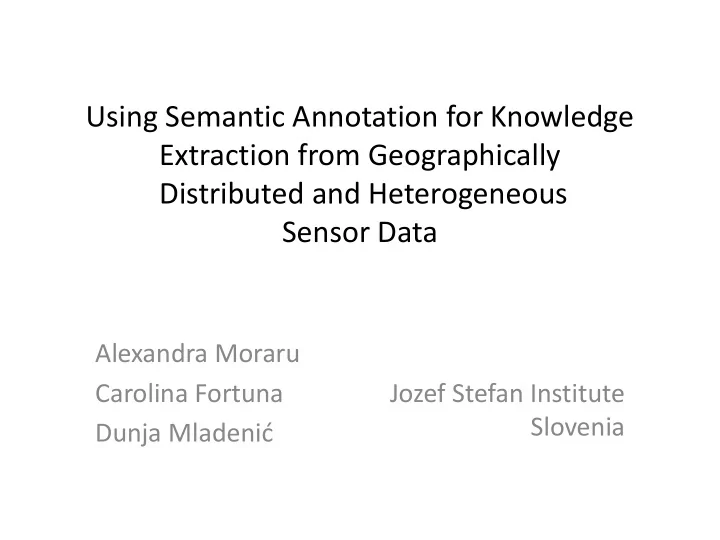

Using Semantic Annotation for Knowledge Extraction from Geographically Distributed and Heterogeneous Sensor Data Alexandra Moraru Carolina Fortuna Jozef Stefan Institute Slovenia Dunja Mladenić
Outline • Introduction • System architecture • Case Study: Participatory Sensing • Conclusions
Introduction Internet of Internet of • Scalability • Scalability • Mobility • Mobility Things Things • Interoperability • Interoperability • Web accessible sensor • Web accessible sensor Sensor Web Sensor Web network and archive network and archive sensor data sensor data • Access to various types • Access to various types Participatory Participatory of data of data • Problems may appear in • Problems may appear in understanding the data understanding the data sensing sensing • Solution: providing • Solution: providing semantic context semantic context
Semantic Annotation • Annotating sensor descriptions with concepts from an ontology • Machine understanding of the sensors descriptions and data streams • Enables reasoning mechanism for selecting streams for processing or monitoring
System Architecture Inference Engine ? Knowledge Base Knowledge Base Ontology Ontology A Logic Rules Logic Rules Semantic Annotations Semantic Sensor Web Sensor Sensor Data Descriptions Publishers
Case Study: Participatory Sensing • Pachube – platform that supports storing and sharing sensor data (stream of measurements). – structured metadata describing the sensor data streams (including natural language description and tags). www.pachube.com • Cyc – general ontology and a knowledge base for representing common sense knowledge – organized by contexts (microtheories) www.opencyc.org
Case Study: Participatory Sensing Individual: IJSSensor <title> IJSSensor</title> isa: Sensor <status>live</status> hasDataStream: IJSSensor-Data1 <location domain="physical" hasDomain: Physical exposure="indoor"> hasExposure: Indoor <lat>46.0425085163033</lat> latitude: (Degree-UnitOfAngularMeasure <lon>14.4882792234421</lon> 46.0425085163033) </location> longitude: (Degree-UnitOfAngularMeasure <data id="0"> 14.4882792234421) <tag>Temperature</tag> <unit type="basicSI" Individual: IJSSensor-Data1 symbol=" ° C">Celsius</unit> isa: DataStream </data> hasUnitOfMeasurement: DegreeCelsius measures: Temperature
Case Study: Participatory Sensing Individual: IJSSensor <title> IJSSensor</title> isa: Sensor <status>live</status> hasDataStream: IJSSensor-Data1 <location domain="physical" hasDomain: Physical exposure="indoor"> hasExposure: Indoor <lat>46.0425085163033</lat> latitude: (Degree-UnitOfAngularMeasure <lon>14.4882792234421</lon> 46.0425085163033) </location> longitude: (Degree-UnitOfAngularMeasure <data id="0"> 14.4882792234421) <tag>Temperature</tag> <unit type="basicSI" Individual: IJSSensor-Data1 symbol=" ° C">Celsius</unit> isa: DataStream </data> hasUnitOfMeasurement: DegreeCelsius measures: Temperature
Case Study: Participatory Sensing Frequent tags for data streams descriptions in Pachube Domain Tag Cyc Number of occurrences Concept temperature 336 Fever Temperature related tags temp 32 Temporary Worker celsius 293 Degree Celsius electricity 389 Electricity Power consumption watts 34 Watt related tags Distinct tags Data streams Total 2238 9466
Searching for Sensors • Which are the sensors that measure temperature in Ljubljana? (and (isa ?X Sensor) (hasDataStream ?X ?DS) (measures ?DS Temperature) (distanceBetween ?X CityOfLjubljanaSlovenia (Kilometer ?DIST)) (lessThan ?DIST 10))
Reasoning with Sensor Data • Detection of anomalous data measurements • data streams measuring temperature • Mediterranean region • Summer time • Temperature measurements below a 10 ° C are considered anomalous • for an outdoor exposure of the sensing device
Reasoning with Sensor Data (implies (and (isa ?SENSOR Sensor) (sensorMeasurmentsInterval ?SENSOR ?INT) (temporalBoundsContain ?SEASON ?INT) (isa ?SEASON SummerSeason) (hasRegionLocation ?SENSOR ?REGION) (hasClimateType ?REGION MediterraneanClimateCycle) (hasExposure ?SENSOR Outdoor) (hasDataStream ?SENSOR ?DS) (measures ?DS Temperature) (valueOf ?DS (DegreeCelsius ?C)) (lessThan ?C 10)) (anomalousMeasurments ?SENSOR ?DS))
Conclusions & Future Work • Semantic annotations can provide context for the sensor measurements and observations • We proposed and discussed a system architecture for automatic annotation – a too general ontology will not be able to successfully annotate all sensor descriptions • Future Work – provide more specific context for the concepts used in sensor annotation – virtual sensor composition
Recommend
More recommend